英语人教版九年级全册unit13 教案
英语人教版九年级全册unit13 Section A (3a-3b)教案
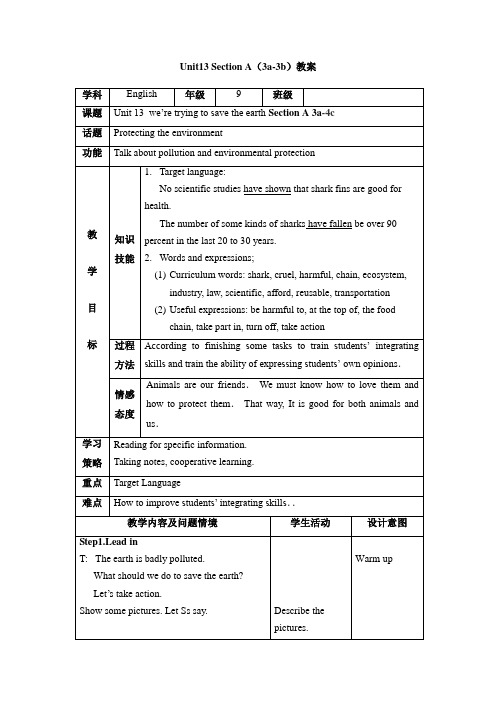
方法
According to finishing some tasks to train students’ integrating skills and train the ability of expressing students’ own opinions.
情感
态度
Animals are our friends.We must know how to love them and how to protect them.That way, It is good for both animals and us.
学习策略
Reading for specific information.
Taking notes, cooperative learning.
重点
Target Language
难点
How to improve students’ integrating skills..
教学内容及问题情境
学生活动
设计意图
Unit13 SectionA(3a-3b)教案
学科
English
年级
9
班级
课题
Unit 13 we’re trying to save the earthSection A 3a-4c
话题
Protecting the environment
功能
Talk about pollution and environmental protection
3. Have the students fill in the blanks in 3b with the words in the box individually. And check their work with some students.
人教版九年级英语全册Unit13SectionA2(3a3b)优秀教学案例

3.运用合作学习法,鼓励学生互相交流、合作,共同完成写作任务,提高写作能力。
(三)情感态度与价值观
1.培养学生对英语阅读的兴趣,增强学生学习英语的自信心。
2.通过阅读和写作,培养学生对过去的尊重和珍惜,培养学生的思辨能力和创新意识。
3.培养学生团队合作的精神,提高学生的沟通能力和人际关系。
人教版九年级英语全册Unit13SectionA2(3a3b)优秀教学案例
一、案例背景
本案例背景以“人教版九年级英语全册Unit13SectionA2(3a3b)”为例,这是一节关于英语阅读理解的课程。通过对本节课的学习,学生能够掌握如何描述过去发生的事情,提高他们的阅读理解能力和写作能力。
在课程开始之前,学生已经学习了过去时态的相关知识,对于描述过去的事情有一定的了解。然而,他们在阅读理解方面还存在一定的困难,特别是对于长篇文章的阅读和理解。因此,本节课的目标是帮助学生提高阅读理解能力,使他们能够更好地理解和描述过去发生的事情。
3.鼓励学生在课后进行自主学习,巩固所学知识,提高阅读理解和写作能力。
五、案例亮点
1.情景创设:通过播放与文章相关的视频或音频,为学生营造一个真实的语言环境,激发学生的学习兴趣和好奇心。这种情境创设不仅有助于学生更好地理解文章内容和情景,而且能够提高学生的语言运用能力。
2.问题导向:设计一系列有针对性的问题,引导学生通过阅读和思考,逐步深入理解文章内容和主题。问题导向的教学策略能够培养学生的批判性思维和问题解决能力,使学生在学习过程中保持积极的状态。
(四)反思与评价
1.在教学过程中,教师要时刻关注学生的学习情况,及时调整教学策略,以满足学生的学习需求。
人教版英语九年级全册Unit13setionA(3a3c)教学设计
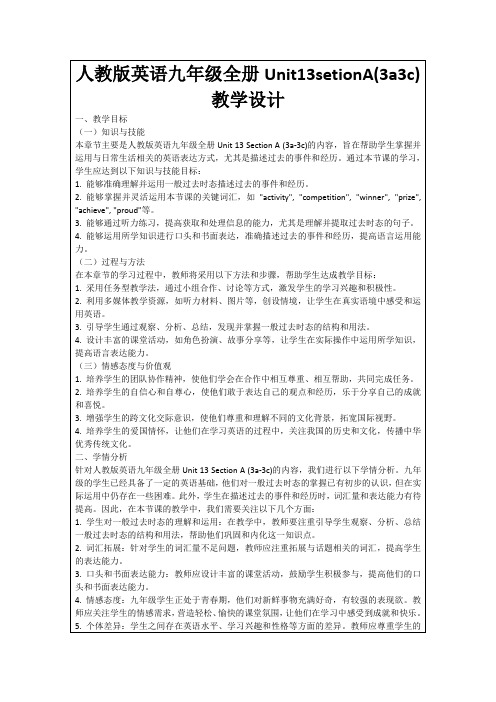
(三)学生小组讨论
1.教学活动设计:教师将学生分成小组,每组选择一个话题,如“last weekend”(上周末)、“my favorite sports activity”(我最喜欢的体育活动)等,要求小组成员用一般过去时态讨论并分享自己的经历。
人教版英语九年级全册Unit13setionA(3a3c)教学设计
一、教学目标
(一)知识与技能
本章节主要是人教版英语九年级全册Unit 13 Section A (3a-3c)的内容,旨在帮助学生掌握并运用与日常生活相关的英语表达方式,尤其是描述过去的事件和经历。通过本节课的学习,学生应达到以下知识与技能目标:
3.引导学生通过观察、分析、总结,发现并掌握一般过去时态的结构和用法。
4.设计丰富的课堂活动,如角色扮演、故事分享等,让学生在实际操作中运用所学知识,提高语言表达能力。
(三)情感态度与价值观
1.培养学生的团队协作精神,使他们学会在合作中相互尊重、相互帮助,共同完成任务。
2.培养学生的自信心和自尊心,使他们敢于表达自己的观点和经历,乐于分享自己的成就和喜悦。
4.能够运用所学知识进行口头和书面表达,准确描述过去的事件和经历,提高语言运用能力。
(二)过程与方法
在本章节的学习过程中,教师将采用以下方法和步骤,帮助学生达成教学目标:
1.采用任务型教学法,通过小组合作、讨论等方式,激发学生的学习兴趣和积极性。
2.利用多媒体教学资源,如听力材料、图片等,创设情境,让学生在真实语境中感受和运用英语。
6.课后作业:
-布置与课堂内容相关的作业,如完成一篇日记,描述过去一天的经历,要求使用一般学生进一步巩固和提高。
人教版九年级英语全册第十三单元教案
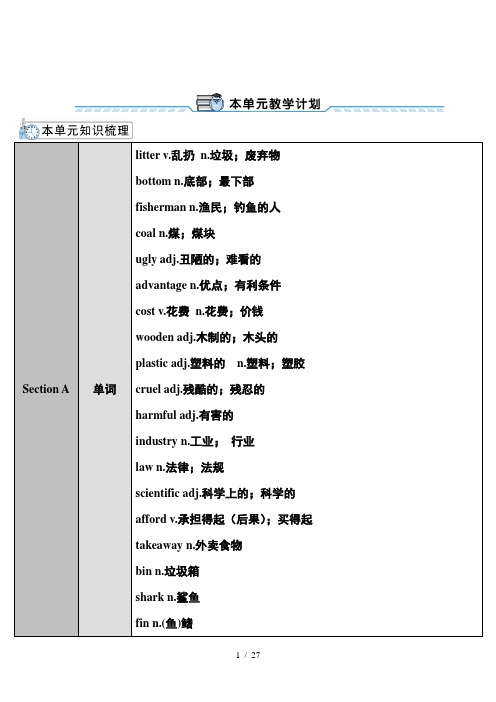
Section A 单词litter v.乱扔n.垃圾;废弃物bottom n.底部;最下部fisherman n.渔民;钓鱼的人coal n.煤;煤块ugly adj.丑陋的;难看的advantage n.优点;有利条件cost v.花费n.花费;价钱wooden adj.木制的;木头的plastic adj.塑料的n.塑料;塑胶cruel adj.残酷的;残忍的harmful adj.有害的industry n.工业;行业law n.法律;法规scientific adj.科学上的;科学的afford v.承担得起(后果);买得起takeaway n.外卖食物bin n.垃圾箱shark n.鲨鱼fin n.(鱼)鳍复习现在进行时、现在完成时和被动语态等的用法。
以“保护环境”为主题,运用本课相关句型与他人展开讨论;能向大家介绍有哪几种污染类型,怎样回收利用废弃物品等。
体会到保护环境的重要性,学会保护大自然、保护地球,从身边的小事做起,号召大家参与到保护环境的行动中来。
【课时建议】本单元建议5课时Section A (1a~2d)……………………………………………………………………………………1课时Section A (3a~4c)……………………………………………………………………………………1课时Section B (1a~1e)……………………………………………………………………………………1课时Section B (2a~2e)……………………………………………………………………………………1课时Section B (3a~3b)……………………………………………………………………………………1课时词汇短语:主要采用多媒体及图片展示法。
基本句子:采用图片展示及交际法(利用多媒体展示两人进行交际时的情景)。
语法:复习现在进行时、现在完成时和被动语态——采用“巧记歌诀”记忆法。
被动语态的用法谁的动作不知道,说出谁做没必要;承受之人需强调,被动语态莫忘了。
人教版九年级英语全册Unit13SectionB3aselfcheck教学设计

c. What responsibilities do you have now, and how do you contribute to your family and society?
5.角色扮演:与同学合作,选取一个家庭场景,进行角色扮演,运用所学词汇和句型进行对话。
b. Translate the following sentences into English.
c. Write a short passage about your generation and how you communicate with others.
2.学生练习:学生在规定时间内完成练习题,教师巡回指导。
目的:激发学生对本节课话题的兴趣,为新课的学习做好情感铺垫。
3.学生分享:邀请几位学生分享他们的故事,其他学生聆听并思考。
4.引入新课:教师总结学生的分享,导入本节课的主题——Unit 13 Section B 3a Self Check。
(二)讲授新知
1.教学活动:教师引导学生学习本节课的词汇和句型,如:teenager, generation, influence, communicate, responsibБайду номын сангаасlities, contribute, take advantage of, make decisions等。
(一)教学重难点
1.重点:本章节的重点在于学生对本单元词汇、句型的熟练运用,以及对阅读、写作技巧的掌握。
难点:如何引导学生将所学的词汇、句型灵活运用于实际情境,提高他们的语言表达能力。
2.重点:培养学生对一般现在时、一般过去时和一般将来时的运用能力。
人教版PEP初中九年级英语全册第13单元Unit 13教学教案
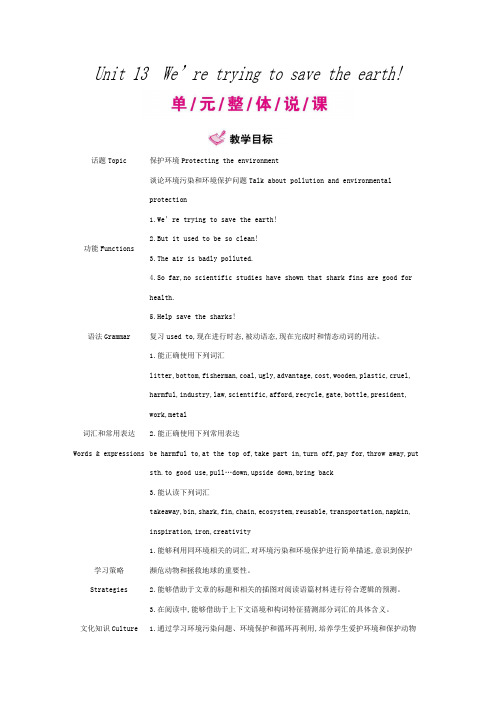
Unit 13 We’re trying to save the earth!话题Topic 保护环境Protecting the environment功能Functions谈论环境污染和环境保护问题Talk about pollution and environmentalprotection1.We’re trying to save the earth!2.But it used to be so clean!3.The air is badly polluted.4.So far,no scientific studies have shown that shark fins are good forhealth.5.Help save the sharks!语法Grammar 复习used to,现在进行时态,被动语态,现在完成时和情态动词的用法。
词汇和常用表达 Words & expressions 1.能正确使用下列词汇litter,bottom,fisherman,coal,ugly,advantage,cost,wooden,plastic,cruel,harmful,industry,law,scientific,afford,recycle,gate,bottle,president,work,metal2.能正确使用下列常用表达be harmful to,at the top of,take part in,turn off,pay for,throw away,putsth.to good use,pull …down,upside down,bring back3.能认读下列词汇takeaway,bin,shark,fin,chain,ecosystem,reusable,transportation,napkin,inspiration,iron,creativity学习策略Strategies 1.能够利用同环境相关的词汇,对环境污染和环境保护进行简单描述,意识到保护濒危动物和拯救地球的重要性。
人教版九年级英语全册Unit13SectionA(GrammarFocus4c)教学设计
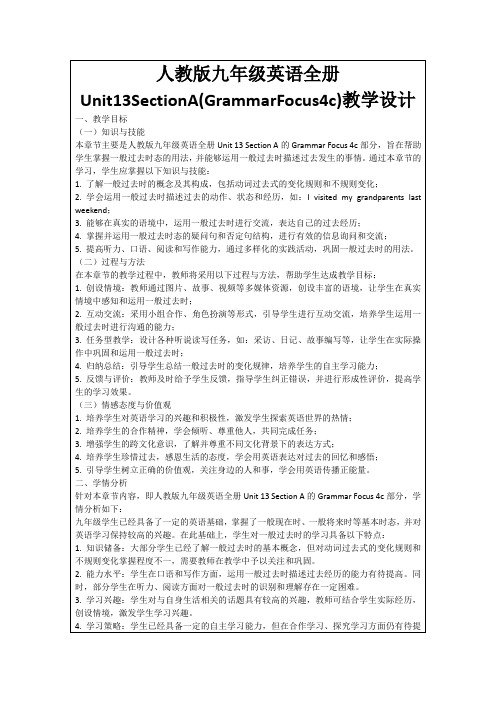
3.学习兴趣:学生对与自身生活相关的话题具有较高的兴趣,教师可结合学生实际经历,创设情境,激发学生学习兴趣。
4.学习策略:学生已经具备一定的自主学习能力,但在合作学习、探究学习方面仍有待提高。教师应引导学生运用多样化的学习策略,提高学习效果。
5.情感态度:学生在学习过程中,可能存在对过去时态的恐惧心理,担心出错。教师应关注学生情感需求,营造轻松、愉悦的学习氛围,帮助学生树立信心。
九年级学生已经具备了一定的英语基础,掌握了一般现在时、一般将来时等基本时态,并对英语学习保持较高的兴趣。在此基础上,学生对一般过去时的学习具备以下特点:
1.知识储备:大部分学生已经了解一般过去时的基本概念,但对动词过去式的变化规则和不规则变化掌握程度不一,需要教师在教学中予以关注和巩固。
2.能力水平:学生在口语和写作方面,运用一般过去时描述过去经历的能力有待提高。同时,部分学生在听力、阅读方面对一般过去时的识别和理解存在一定困难。
2.培养学生的合作精神,学会倾听、尊重他人,共同完成任务;
3.增强学生的跨文化意识,了解并尊重不同文化背景下的表达方式;
4.培养学生珍惜过去,感恩生活的态度,学会用英语表达对过去的回忆和感悟;
5.引导学生树立正确的价值观,关注身边的人和事,学会用英语传播正能量。
二、学情分析
针对本章节内容,即人教版九年级英语全册Unit 13 Section A的Grammar Focus 4c部分,学情分析如下:
4.教师通过多媒体教学资源,如动画、视频等,展示一般过去时的实际运用场景,帮助学生更好地理解所学知识。
人教版九年级英语全册Unit13SectionB3a3b教学设计

3.在口语表达方面,部分学生存在紧张、焦虑情绪,课堂参与度不高,教师应关注学生的情感需求,创造轻松愉快的课堂氛围,激发学生的表达欲望;
4.学生在小组合作中,团队协作能力和沟通能力有待加强,教师需引导学生积极参与,培养学生的合作精神;
(二)讲授新知
1.教学内容:
(1)教师讲解一般现在时和一般过去时的区别与用法;
(2)引入3a-3b阅读材料,带领学生阅读并分析文章中的人物喜好和经历;
(3)讲解wh-疑问词在询问和回答关于个人喜好和经历问题中的应用。
2.教学方法:
(1)采用讲解、示范、举例等方式,帮助学生掌握语法知识;
(2)通过问答、讨论等形式,引导学生运用目标语言进行交流;
5.树立正确的人生观和价值观,引导学生追求积极、健康、向上的生活。
二、学情分析
针对九年级学生,他们在英语学习方面具备一定的基础,但在本章节的学习中,仍需关注以下学情:
1.学生在词汇和语法方面的掌握程度参差不齐,部分学生对表示喜好和兴趣的词汇及一般现在时、一般过去时的运用尚不熟练,需要教师在教学中进行针对性辅导;
(1)创造轻松、愉快的课堂氛围,鼓励学生大胆开口,提高口语表达能力;
(2)组织丰富多样的课堂活动,如角色扮演、小组讨论等,培养学生的小组合作意识;
(3)提供明确的评价标准和反馈,帮助学生了解自己的优势和不足,提高合作能力。
四、教学内容与过程
(一)导入新课
1.教学活动设计:
(1)教师以一首英文歌曲《My Favorite Things》作为课堂导入,激发学生对主题的兴趣;
(3)利用多媒体教学资源,如PPT、动画等,辅助讲解,提高教学效果。
- 1、下载文档前请自行甄别文档内容的完整性,平台不提供额外的编辑、内容补充、找答案等附加服务。
- 2、"仅部分预览"的文档,不可在线预览部分如存在完整性等问题,可反馈申请退款(可完整预览的文档不适用该条件!)。
- 3、如文档侵犯您的权益,请联系客服反馈,我们会尽快为您处理(人工客服工作时间:9:00-18:30)。
Unit 13 We’re trying to save the earth!Dajin Middle School : Wu Jingxia一、教学目标:1. 语言知识目标基本词汇:litter, advantage, bottom, fisherman, coal, ugly, cost, wooden, plastic, takeaway, bin, shark, fin, method, cruel. Harmful, chain, ecosystem, industry, law,scientific, afford, reusable, transportation, recycle, napkin, upside, gate, bottle,president, inspiration, iron, work, metal, creativity,基本词组:be harmful to, at the top(of sth.), take part in, turn off, take action, throw away, put sth. to good use, pull… down, bring back基本句型:We’re trying to save the earth!The river used to be so clean.The air is badly polluted.No scientific studies have showed that shark fins are good for health.We should help save the sharks.2. 技能目标: 能正确运用现在进行时,现在完成时,被动语态,情态动词和used to 句型。
3. 情感目标:有环境危机意识,学会关注环境保护环境。
二、教学重难点:1. 教学重点:(1)能正确运用现在进行时,现在完成时,被动语态,情态动词和usedto 句型。
(2)保护环境的措施方法。
2. 教学难点:能正确运用现在进行时,现在完成时,被动语态,情态动词和used to 句型。
三、教学步骤:Section A 1 (1a-2d)I. PresentationShow the picture of the earth and tell students the earth is polluted now.For example: (1) The factories that burn coal pollute the air with a lot of black smoke.(2) Factories put waste into the river.(3) People should throw away litter in the bin.(4)There are more cars on the road.II. LearningHere are some words related to different kinds of pollution. Write them in the box below.____________ ___________ _________________________ ___________ _________________________ ___________ _________________________ ___________ _____________Keys : noise pollution loud music planes mobile phones building houses air pollution factories smoking cars building houseswater pollution ships rubbish littering factoriesIII. Listeningclose down clean up2. Listen again and check (√) the sentences you hear.1) We could go fishing in the river.2) The river was really dirty.3) The river has always been the nicest river in this town.4) We should ask the teachers for help.Keys: 2 3IV. Practice1. Role-play the conversation in 1c.Mark: The river was dirty. Even the bottom of the river was full of rubbish. Tony: But it used to be so clean!Mark: Yes, but people are throwing litter into the river.Tony: Everyone in this town should play a part in cleaning it up!2. Make conversations using the pollution in 1a.A: The river has always been the nicest river in this town.B: Yes, it used to be so clean.A: But I was there last weekend and the river was really dirty.B: What caused the problem?A: People are throwing litter into the river.B: What should we do?A: Factories are also putting waste into the river.B: Yes, everyone in this town should play a part.A: We should write to the government and ask them to close down the factories. B: What else can we do?A: Everyone should help to clean up the river.V. Language points1. We’re trying to save the earth!我们正在竭尽全力拯救地球!try to do =try one’s best to do 努力去做某事。
e.g. Every student should try to study hard in order to study in a university.为了进入大学学习,每个学生都应该努力学习。
2. Here are some words related to different kinds of pollution.be related to 与…有关e.g. I am not related to him in any way. 我和他无任何关系。
3. Everyone in this town should play a part in cleaning it up!play a part in 在……方面起作用e.g. A good diet plays a large part in helping people live longer.健康的饮食在帮助人们长寿方面起着非常大的作用。
play a part 在……中扮演角色e.g. He was invited to play a part in this TV play.他被邀请参加这个电视剧的演出。
4. Even the bottom of the river was full of rubbish.Yes, but people are throwing litter into the river.litter 和rubbish 都可指“垃圾”,用作不可数名词。
rubbish 指“没用的东西(被扔或将要丢弃的无用的东西)”不可回收。
litter 指“(室内或公共场所)乱扔的废物(纸屑、不要的包装纸、废瓶等)”还可回收e.g. Throw the rubbish out. 把垃圾扔出去。
The room is full of rubbish. 房间里堆满了垃圾。
Pick up your litter after a picnic. 野餐后将废弃物收拾好。
VI. Listening1. 2a Listen to the interview. Circle the kinds of pollution that Jason and Susan talk about.A. land pollutionB. air pollutionC. noise pollutionD. water pollutionKeys: B A2. 2b Listen again and complete the sentences.1) The air is badly polluted because there are ___________ on the road these days.2) Factories that burn coal also ________ the air with a lot of black smoke.3) There is also too much rubbish and waste. People _________________ things every day.4) People are also littering in ______________ like parks. This is turning beautiful places into ugly (丑陋) ones.Keys: more cars pollute are throwing away public places3. Listen and answer the questions.1) Who is the interviewer talking to?2) What are they talking?3) What other problems do they see?Keys: Susan and Jason.The environmental problems.There’s too much rubbish and waste in the streets.VII. Practice (2c)Use the information in 2a and 2b to role-play conversations between Jason and Susan. Jason: The air has become really polluted around here. I’m getting very worried.Susan: Yes, I used to be able to see stars in the sky.Jason: The problem is that…VIII. DiscussionAsk students what we should do to save the earth. Help students answer, turn off thelights when you leave a room; stop riding in cars; stop using paper towels or napkins;recycle books and paper.IX. ReadingInterviewer: Jason and Susan, what are your ideas for solving these problems?Jason: Well, to cut down air pollution, we should take the bus or subway instead of driving. Susan: Yeah, or ride a bike. There are other advantages (优点) of bike riding. It’s good for health and it doesn’t cost (花费) anything!Interviewer: Great ideas! What about waste pollution?Susan: Mmm, I think simple things like bringing a bag to go shopping can help. I started doing that a year ago.Jason: Me, too. Also, I never take wooden chopsticks or plastic (塑料) forks when I buy takeaway (外卖食品) food. I use the ones at home.Susan: And remember to throw rubbish in the bins and keep public places clean and beautiful for everyone.Interviewer: So together, our actions can make a difference and lead to a better future!X. Summary and language points1. This is turning beautiful places into ugly ones.turn… into… 把……变成……e.g. The icy rain seemed like to turn into snow.渐渐地冻雨又变成雪花的模样。
